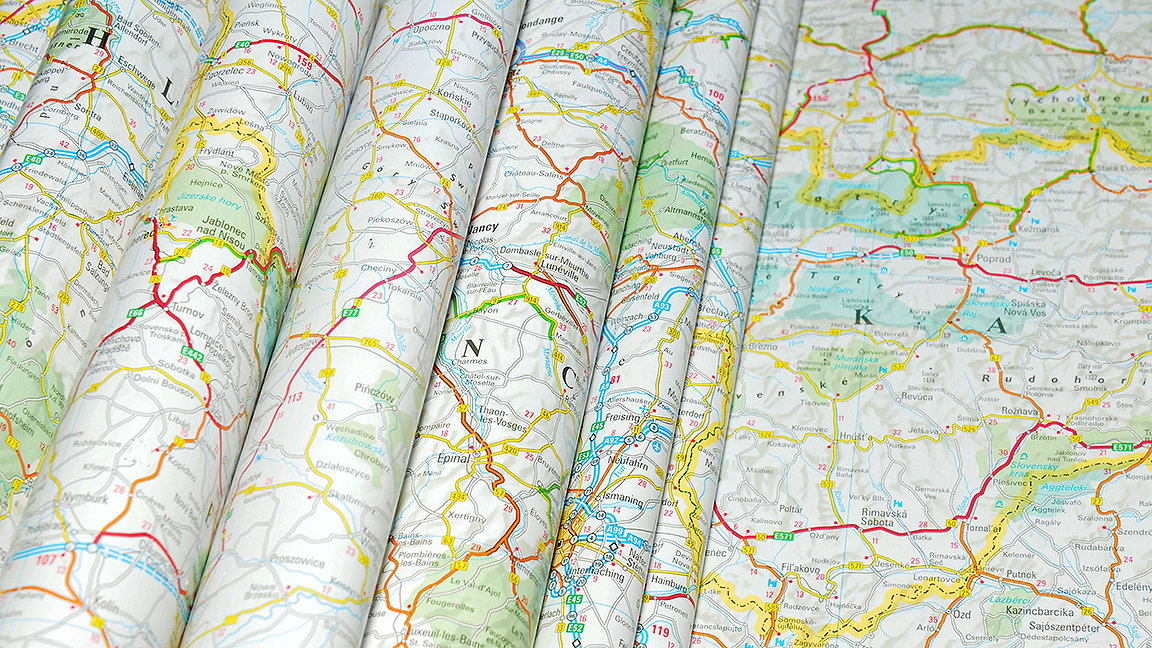
It may seem easy to read and understand information on maps if colours and symbols are used consistently. But misunderstandings can sometimes arise because of cultural associations.
For instance, if a map uses traffic light colours we may intuitively interpret elements represented green as good or correct, yellow ones with caution, and those in red as wrong or dangerous. But in fact the cartographer uses green to represent busy streets and red for streets with less traffic, showing the best way to move across the city.
This example shows that using and representing data in a way that is inconsistent with cultural norms can prompt the user to make false inferences. As a result, poor decisions may be made, based on erroneous analysis or interpretation, or even incorrect data. For example, a governor can decide on the use of public resources to improve the state of a street based on cartography that represents its status.
Geographic data has become more important since the COVID-19 pandemic, as some television reports and social networks at the beginning of the pandemic, in Chile, for example, showed information on the spatial distribution of new cases. This drew attention to the issue of privacy of personal data and ethics in the use of such information.
Development of ethical principles surveyed
Consequently, the need for guidelines for the ethical use of geospatial information has become a priority, as there is currently no common set of global ethical principles. Such principles might include integrity, responsibility, impartiality, and transparency.
UN Global Geospatial Information Management (UN-GGIM), part of the UN's Statistics Division, is involved in improving the use of geographical data to support decision-making. As part of this work, it has been researching the principles and guidelines that geographical, cartographical and national governmental organisations have developed to the ensure the ethical use of geospatial data in the Americas.
UN-GGIM Americas' Academic Network therefore carried out two surveys to understand the state of art across the continent; first, in the ethical use of geospatial information, sent to the national members of UN-GGIM Americas and second, to educational institutions asking about education on the subject.
However, only 13 of the 36 member states that make up the network responded to the first survey, namely Canada, Chile, Colombia, the Dominican Republic, Ecuador, El Salvador, Guatemala, Mexico, Nicaragua, Panama, Peru, Suriname and the US.
Respondents indicate lack of data use governance
The most significant result of the survey is that 81% of respondents said their governments have no standards on the ethical use of geographical information, while 38% indicated that not even the technical use of such data is regulated in their respective nations.
On the other hand, 62% indicated that they still do not control the ethical use of geospatial data, albeit under general data guidance on geographical information. Meanwhile, 56% of the countries surveyed have no official regulations that veto inappropriate use of data, and those that have formal norms indicate that they are for personal data in general rather than geospatial data in particular.
'81% of respondents said their governments have no standards on the ethical use of geographical information'
Provision of ethics training varies
The network also surveyed educational institutions in the Americas, to find out about the ethical use of geographical information in education. This survey was also sent to European educational institutions in July. Two versions of this survey were distributed in the Americas, one in Spanish and the other in English. But answers to the two different versions made Academic Network of UN-GGIM: Americas realise that training provision for the ethical use of geographic data is quite different in the continent.
Only 25% of institutions in the Americas that responded in English have a course dedicated to the ethics of using geographical information. This increases to 60% for the Spanish-speaking respondents, with a comparable figure of 58% from European responses.
In the last question in the survey, 85% of the responses from the Americas and Europe said they intended to include education about ethics in future curricula.
'85% of the responses from the Americas and Europe said they intended to include education about ethics in future curricula'
Sector recognises need for more work
Finally, the survey on regulating the ethical production of geospatial information indicates that the countries are aware that this is essential to ensure quality and reliability. Even though these issues are starting to feature on the agenda of some governments, there is still much further to go. Ideally, regulatory frameworks for the ethical use of geospatial data should be established that all countries can adopt.
There are already some great initiatives in this area, such as Benchmark and EthicalGEO's Locus Charter, which are proposing common international principles to help geospatial data users make more informed decisions.
The education survey answers also indicate that academia still has significant work to do to ensure that future technicians, professionals and society are aware of these ethical issues, and takes them into account when making decisions.
Rosario Casanova is senior lecturer in geomatics at the Land Surveying Institute in the Faculty of Engineering at the Universidad de la República de Uruguay and chair of the Academic Network of UN-GGIM: Americas
Contact Rosario: Email
Related competencies include: Data management, Ethics, Rules of Conduct and professionalism, GIS (geographical information systems), Legal and regulatory compliance
RICS' view on ethical use of data
Ethics are central to the RICS Rules of Conduct, and an understanding of ethical behaviour in the use of locational and personalised data is a distinct, and increasingly important, issue for chartered surveyors and firms.
RICS members are advised how to store data securely in the current edition of Data handling. But it is important to understand and respect the right to privacy when collecting and storing personalised locational information. The Locus Charter also deals with geospatial data and ethics, while real-estate alliance the RED Foundation likewise explores the property profession's ethical use of information.
Legislation compliance is also critical and surveyors should be aware of the influence and importance of General Data Protection Regulation (GDPR) Compliance Guidelines and the US equivalent California Consumer Privacy Act (CCPA) with regards to privacy rights and holding personal information.
Geospatial and locational data is powerful and can be used for good or ill. It is important therefore that RICS continues to contribute to the conversation, and recognises unconscious and conscious bias in property data use. Surveyors are not data-harvesting bots, and need to understand why, where, for whom and for what purpose they collect information, and think carefully about its use.

